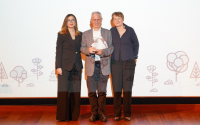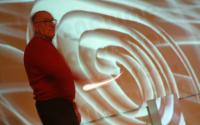29 October 2007Ian Sample
Cutting greenhouse gases and switching to sustainable development are unlikely to prevent disasters caused by climate change, one of the world's most respected environmentalists warns today.
Professor James Lovelock, the leading independent environmental scientist, claims that even the most pessimistic outcomes predicted by the UN's Intergovernmental Panel on Climate Change (IPCC) fail to recognise the speed with which global warming will progress.
In a speech at the Royal Society, Prof Lovelock will describe how he has arrived at an "apocalyptic view" of the future, in which 6 to 8 billion people face diminishing food and water supplies in an increasingly intolerable climate.
Earlier this year, the IPCC published its final report on the likely extent of global warming. It concluded that average global temperatures could rise by as much as 6.4C by the end of the century if carbon emissions continue to increase. A rise of 4C was most likely, the panel said.
The rising temperatures could force hundreds of species to become extinct and trigger conflicts in countries struck by droughts and severe flooding.
But Prof Lovelock will tell the society that while the IPCC report is written in "properly cautious scientific language", it "gives the impression that global heating is serious but the worst consequences are avoidable if we take appropriate action now. Sadly, even the most pessimistic of the climate prophets of the IPCC panel do not appear to have noticed how rapidly the climate is changing."
He believes computer models used by IPCC scientists underestimate the magnitude of climate change by failing to consider the world as an entity in which living organisms inextricably feed into the environment, for example by releasing or absorbing greenhouse gases. Instead, scientists treat deforestation, changes in marine populations and ocean acidification separately from other aspects of climate change such as melting ice sheets.
Prof Lovelock will refer to a study he published in Nature in 1994 with Lee Kump, a professor of geoscience at Penn State University, which attempted to model a "live Earth", where ocean and land organisms have a strong bearing on climate. The study revealed that if atmospheric carbon dioxide levels reached 500ppm (parts per million), global temperatures would rise rapidly by 6C. The IPCC calculations suggest around a 2C rise for the same CO2 levels. The atmospheric level of CO2 stands at 380ppm but is rising by 2ppm a year.
"We are at war with the Earth and as in a blitzkrieg, events proceed faster than we can respond ... For this reason alone, it is probably too late for sustainable development," he will say.
Prof Lovelock is similarly gloomy over cuts in carbon dioxide emissions, claiming that positive feedbacks, which exacerbate warming, suggest that "implementing Kyoto or some super-Kyoto is most unlikely to succeed," referring to the international carbon reduction agreement that expires in 2012. He will call for research aimed at reducing climate change by protecting ecosystems or altering them in ways that help them reflect solar radiation or absorb carbon dioxide.
http://www.guardian.co.uk/environment/2007/oct/29/climatechange.sciencenews






